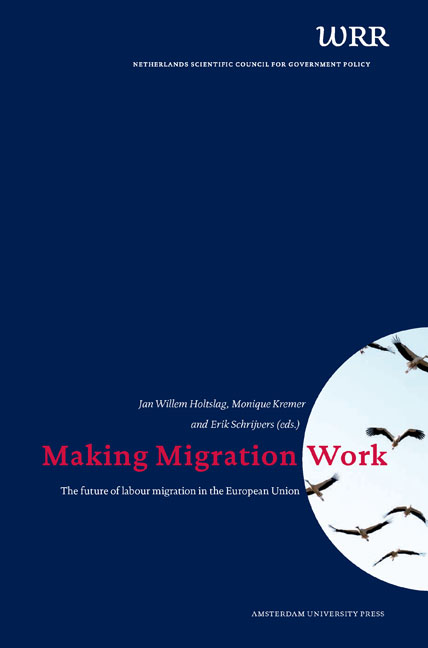Book contents
- Frontmatter
- Contents
- Introduction
- Acknowledgements
- 1 How to Make Migration Work
- 2 The Global and European Neighbourhood Migration Systems: Trends, Policy Choices, Governance Challenges and a Look Ahead
- 3 Satisfying Labour Needs in an Ageing Society
- 4 Migrant Workers: Inevitability or Policy Choice?
- 5 Intra-EU Labour Mobility after Eastern Enlargement and During the Crisis: Main Trends and Controversies
- 6 Labour Migration From Central and Eastern Europe and the Implications for Integration Policy
- About the Authors
2 - The Global and European Neighbourhood Migration Systems: Trends, Policy Choices, Governance Challenges and a Look Ahead
Published online by Cambridge University Press: 23 June 2021
- Frontmatter
- Contents
- Introduction
- Acknowledgements
- 1 How to Make Migration Work
- 2 The Global and European Neighbourhood Migration Systems: Trends, Policy Choices, Governance Challenges and a Look Ahead
- 3 Satisfying Labour Needs in an Ageing Society
- 4 Migrant Workers: Inevitability or Policy Choice?
- 5 Intra-EU Labour Mobility after Eastern Enlargement and During the Crisis: Main Trends and Controversies
- 6 Labour Migration From Central and Eastern Europe and the Implications for Integration Policy
- About the Authors
Summary
INTRODUCTION
International migration, a key by-product of globalisation, is already one of this century's unavoidable issues. It is here, it is going to stay and it is going to grow larger. Moreover, it will only become more unavoidable as the century progresses. Though few issues seem to be pricklier for high-income countries, good management of migration is possible. It is managed with varying degrees of success all across high-income countries. However, it requires something that most countries are not particularly good at: the ability to think and act across the whole of government. And when it comes to integration issues, it also requires the engagement of the whole of society, a rarity everywhere.
This essay argues that the shrinking pool of workers and consumers, a quickly ageing population, and the resulting negative demographic momentum raise crucial questions about the future of many of Europe's high-income countries. Specifically, it is about who will do the work, who will pay the taxes needed to support the dense social infrastructures of European societies, and who will buy the products and services that European firms produce? One option is getting more out of the existing population by raising labour productivity and increasing the labour force participation rates. Another option is to increase fertility. Part of the answer must also lie with increasing intra-EU mobility and strategically selecting and attracting more workers and consumers from Europe's neighbourhood regions.
KEY OBSERVATIONS
The economic importance of migration will continue to grow for both sending and receiving countries. In the next decade or so, total migration towards high-income countries will likely grow only modestly as these countries increasingly focus on selective migration, a further curtailing of family migration, and an ever more systematic redirecting of asylum flows. The combined effect of sputtering economies and continuing fiscal woes, with their enormous overhangs of unemployed and underemployed workers (and especially the massive unemployment of young persons), suggest that unemployment and social unrest are likely to last for most of this decade.
However, this does not mean less global migration. Any slack in migration to high-income countries will be picked up with ever-increasing intensity by medium-income countries, first and foremost by the ‘BRIC plus’, which includes Turkey, Mexico, South Africa and Indonesia.
- Type
- Chapter
- Information
- Making Migration WorkThe Future of Labour Migration in the European Union, pp. 39 - 50Publisher: Amsterdam University PressPrint publication year: 2013



